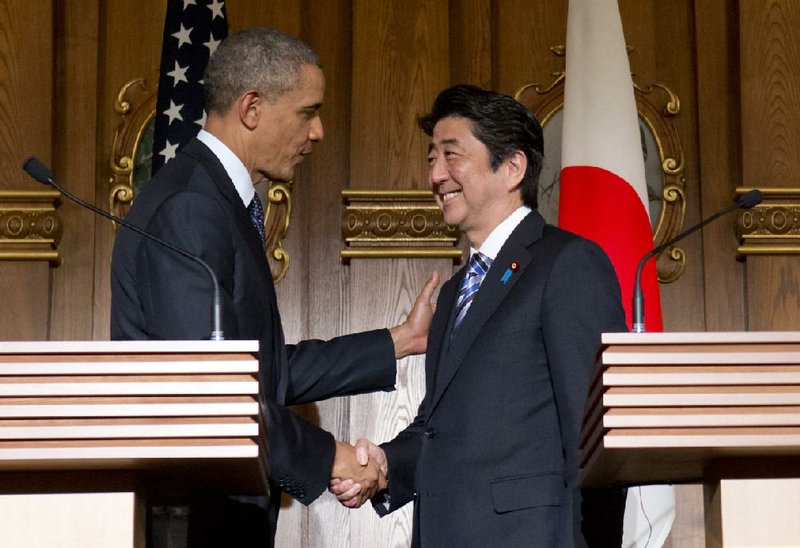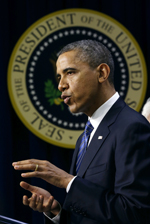TOKYO - President Barack Obama affirmed Thursday that U.S. treaty obligations to Japan extend to a chain of contested islands in the East China Sea, even as he emphasized that Japan and China should seek a peaceful resolution to the dispute.
Speaking at a news conference with Prime Minister Shinzo Abe, Obama said the United States does not take a position “on final sovereignty over the islands,” which are called the Senkaku by Japan and the Diaoyu by China. But he noted that a long-standing treaty dictates the United States would defend against any attack aimed at Japan.
“We don’t take a position on final sovereignty determinations with respect to Senkakus, but historically they have been administered by Japan, and we do not believe that they should be subject to change unilaterally,” he said. “And what is a consistent part of the alliance is that the treaty covers all territories administered by Japan.”
“At the same time,” Obama said, he has told Abe directly “that it would be a profound mistake to continue to see escalation around this issue rather than dialogue and confidence-building measures between Japan and China.”
Obama emphasized that the position he was articulating “is not new.” He noted at one point, “First of all, the treaty between the United States and Japan preceded my birth, so obviously, this isn’t a ‘red line’ that I’m drawing.”
But the president’s statement highlighted a broader theme in his week-long Asian trip: The United States remains focused on Asia and will deepen its economic and security ties in the region even as it contends with unrest in Ukraine and the Middle East.
Yang Yujun, a Chinese Defense Ministry spokesman,dismissed Obama’s remarks, saying the “Diaoyu islands are the territory of China, and the Chinese army is fully capable of defending it and doesn’t need other countries to provide the so-called safety guarantee.”
Yang added, “Some people in Japan like to hype up this issue, but it’s nothing more than waving a chicken feather as an arrow.” He said Japan is using a pretext to assert its authority.
Abe said Thursday that “the Japan-U.S. alliance has been revived very strongly” by Obama’s visit to Tokyo, adding that his confidence in America “became even stronger” as a result of their conversations.
When it came to the question of whether the United States would go to Japan’s aid if needed, Abe said: “We want to make this a peaceful region which values laws, and in doing this strengthening of our bilateral alliance is extremely important. On this point, I fully trust President Obama.”
Obama also defended his handling of foreign crises in the past, such as his decision not to take military action against Syria after the government used chemical weapons against its own people. He said the majority of the Syrian government’s chemical-weapons cache has been taken out of the country.
“That’s as a consequence of U.S. leadership,” he said. “And the fact that we didn’t have to fire a missile to get that accomplished is not a failure to uphold those international norms; it’s a success.”
The two leaders also spoke of how they hoped to foster closer economic ties between their countries through adoption of the Trans-Pacific Partnership initiative, a trade deal involving 12 nations. But they acknowledged they had yet to reach a compromise on key obstacles to a final accord, such as how much Japan would open up its agricultural and automotive sectors to foreign competition.
Negotiators worked into the night in an effort to make progress on the trade deal.
Right after the news conference, the president met privately with three relatives of Japanese citizens who were abducted by North Korea, a White House official confirmed, a move that underscored growing international concern over how to handle that regime’s human-rights abuses.
Before attending a state dinner at the Imperial Palace on Thursday night, Obama paid tribute to Japan’s technological innovation and culture, visiting the Meiji Shrine and playing soccer with a Japanese robot at the National Museum of Emerging Science and Innovation. The technology event, which celebrated the renewal of a 10-year scientific collaboration agreement between the two countries, featured a prerecorded message from the International Space Station’s Japanese commander and two American flight engineers serving alongside him.
The president spoke to about 30 students about the potential of technological innovation to address issues ranging from climate change to disease, though he quipped that the robots were so advanced that they intimidated him.
“I have to say that the robots were a little scary; they were too lifelike,” he said. “They were amazing.”
Front Section, Pages 2 on 04/25/2014

